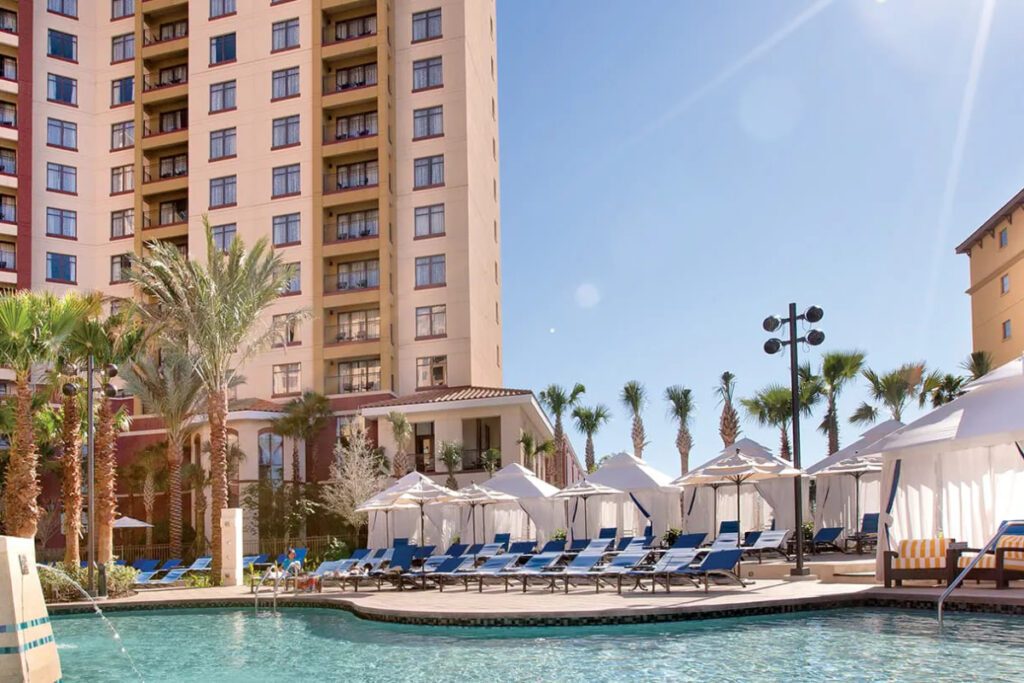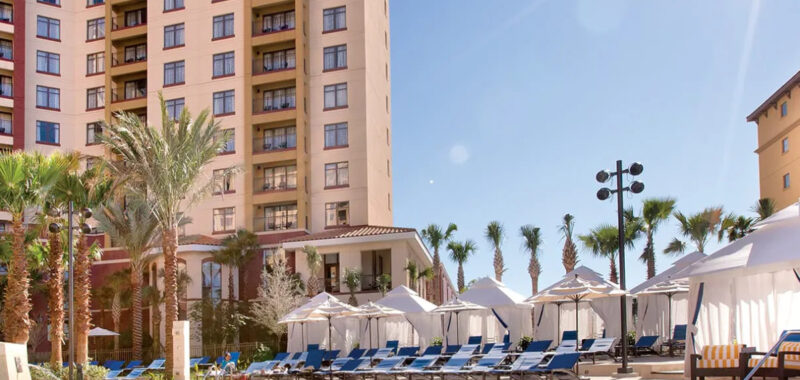
Skift Take
Could international expansion help offset sluggish growth in the U.S.? “Global” was the word executives said the most on earnings calls we reviewed.
The three largest U.S.-based sellers of vacation ownership, or timeshares, have seen a broad pullback in consumer spending behavior.
During earnings calls, executives noted an increased consumer hesitancy to buy timeshares, particularly in the bottom third of new buyers.
However, surveys suggest that people already owning timeshares strongly intend to use them within the next year. The pullback comes from a high level of demand. In 2023, the sector saw sales volume of $11 billion â a full recovery from pre-pandemic levels.
Here are key points Skift heard during second-quarter earnings calls.
Hilton Grand Vacations
The largest vacation ownership company, Hilton Grand Vacations, has lowered its full-year EBITDA guidance to $1.075-$1.135 billion, down $125 million from before. The company said it expected to see macroeconomic pressure on its target customers in the back half of the year and anticipated flattening buyer tour flow with growth.
“As we moved into June, however, we experienced a broad-based pullback in consumer spending behavior,” said CEO Mark Wang. “This shift was evident across all our brands and customer segments, but it was particularly acute in our new buyers segment.”
Hilton Grand Vacations aims to improve its direct online marketing to counteract softness in local marketing.
It’s also continuing to integrate its recent $1.5 billion acquisition of Bluegreen and restructure its sales and marketing organization, moving from two regions to five regions with multiple sub-regions to better support its expanded footprint of properties.
Marriott Vacations Worldwide
Marriott Vacations Worldwide had mixed second-quarter results. The company saw its adjusted EBITDA decline 29% year-over-year, and it modestly reduced its adjusted EBITDA forecast for the year.
Marriott Vacations Worldwide saw the effectiveness of its sales process for first-time buyers decline by 12%, and it said it is adjusting its sales promotions accordingly.
On the bright side, the company’s rental profit increased over 60% year-over-year. The company is also expanding its footprint, with a new Waikiki resort opening in October.
Wyndham Destinations
Unlike its rivals, Travel + Leisure Co. was optimistic about Wyndham Destinations, its timeshare brand. Travel + Leisure Co. increased its full-year 2024 EBITDA guidance to $915 to $935 million.
Despite some headwinds, executives were optimistic about growth prospects for vacation ownership, citing strong forward bookings. Many timeshare buyers and owners use loans, and Wyndham Destinations is seeing some pressure on loan performance, particularly for customers with weaker credit scores. The parent company expects to have to set aside more money for lost loans than it had previously planned.
Executives said that new owner tours were up 22% in the quarter and that average spending per customer surpassed expectations.
Executives partly credited the good performance with traction from a new marketing program that touts the points one can earn and redeem via the loyalty program of hotel group Wyndham Worldwide, a different company. Travel + Leisure Co.’s acquisition of Accor’s timeshare business this year has also been positive, they said.
Going Global
“Global” was the most-used word by executives in these earnings calls. Today, most of the customer base and property network for these three vacation ownership companies are in North America. But each has plans to grow internationally.
Marriott Vacations Worldwide is planning a new Marriott resort in Thailand, and it recently reopened its second Bali sales center.
Hilton Grand Vacations sees opportunities in boosting its sales of units to Japanese buyers if the value of the yen appreciates relative to the dollar. Its acquisition of Bluegreen has grown its geographic footprint. It now has properties in Europe (28 resorts), Mexico & Caribbean (5 resorts), and Japan (two resorts).
Travel and Leisure Co. saw its international tour flow jump over 50% in the second quarter, thanks partly to the acquisition of the Accor timeshare business.
Maui Still Underperforming
Executives said that Maui’s recovery from wildfires a year ago has been slower than expected.
Both Marriott Vacations Worldwide and Hilton Grand Vacations have reopened their resorts. However, the companies haven’t been able to sell visitors on their products because their sales teams haven’t yet been rebuilt due to displacements.
At Marriott Vacations Worldwide, the Maui underperformance will likely reduce contract sales by about $10 million for the full year.
Hilton Grand Vacations’s CEO reported a similar weakened performance. Wang highlighted difficulties in rehiring staff, particularly due to housing challenges in Maui, especially for the brand’s property near Lahaina.
Timeshare Owners Still Happy
According to a July survey of 500 timeshare owners, 70% have booked their next stay, double the incidence of overall travelers, according to the American Resort Development Association.
About six out of 10 timeshare owners plan to travel over the next four months when overall travel demand is expected to decline significantly, ARDA’s survey said.
Accommodations Sector Stock Index Performance Year-to-Date
What am I looking at? The performance of hotels and short-term rental sector stocks within the ST200. The index includes companies publicly traded across global markets, including international and regional hotel brands, hotel REITs, hotel management companies, alternative accommodations, and timeshares.
The Skift Travel 200 (ST200)Â combines the financial performance of nearly 200 travel companies worth more than a trillion dollars into a single number. See more hotels and short-term rental financial sector performance.
Read the full methodology behind the Skift Travel 200.

